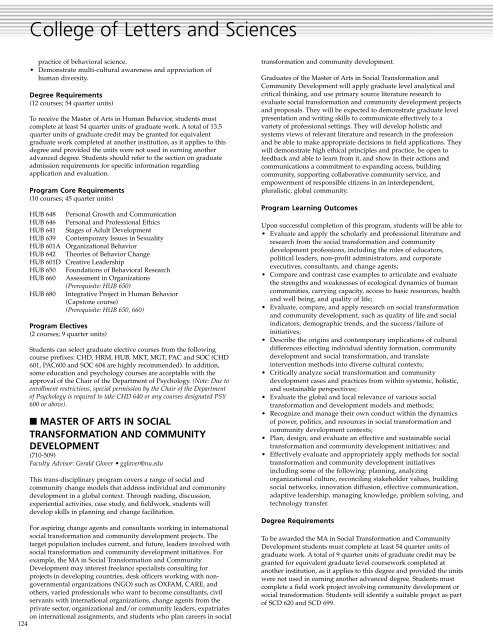Catalog 73 - National University
Catalog 73 - National University
Catalog 73 - National University
- No tags were found...
You also want an ePaper? Increase the reach of your titles
YUMPU automatically turns print PDFs into web optimized ePapers that Google loves.
College of Letters and Sciencespractice of behavioral science.• Demonstrate multi-cultural awareness and appreciation ofhuman diversity.Degree Requirements(12 courses; 54 quarter units)To receive the Master of Arts in Human Behavior, students mustcomplete at least 54 quarter units of graduate work. A total of 13.5quarter units of graduate credit may be granted for equivalentgraduate work completed at another institution, as it applies to thisdegree and provided the units were not used in earning anotheradvanced degree. Students should refer to the section on graduateadmission requirements for specific information regardingapplication and evaluation.Program Core Requirements(10 courses; 45 quarter units)HUB 648 Personal Growth and CommunicationHUB 646 Personal and Professional EthicsHUB 641 Stages of Adult DevelopmentHUB 639 Contemporary Issues in SexualityHUB 601A Organizational BehaviorHUB 642 Theories of Behavior ChangeHUB 601D Creative LeadershipHUB 650 Foundations of Behavioral ResearchHUB 660 Assessment in Organizations(Prerequisite: HUB 650)HUB 680 Integrative Project in Human Behavior(Capstone course)(Prerequisite: HUB 650, 660)Program Electives(2 courses; 9 quarter units)Students can select graduate elective courses from the followingcourse prefixes: CHD, HRM, HUB, MKT, MGT, PAC and SOC (CHD601, PAC600 and SOC 604 are highly recommended). In addition,some education and psychology courses are acceptable with theapproval of the Chair of the Department of Psychology. (Note: Due toenrollment restrictions, special permission by the Chair of the Departmentof Psychology is required to take CHD 640 or any courses designated PSY600 or above).■ MASTER OF ARTS IN SOCIALTRANSFORMATION AND COMMUNITYDEVELOPMENT(710-509)Faculty Advisor: Gerald Glover • gglover@nu.eduThis trans-disciplinary program covers a range of social andcommunity change models that address individual and communitydevelopment in a global context. Through reading, discussion,experiential activities, case study, and fieldwork, students willdevelop skills in planning and change facilitation.For aspiring change agents and consultants working in internationalsocial transformation and community development projects. Thetarget population includes current, and future, leaders involved withsocial transformation and community development initiatives. Forexample, the MA in Social Transformation and CommunityDevelopment may interest freelance specialists consulting forprojects in developing countries, desk officers working with nongovernmentalorganizations (NGO) such as OXFAM, CARE, andothers, varied professionals who want to become consultants, civilservants with international organizations, change agents from theprivate sector, organizational and/or community leaders, expatriateson international assignments, and students who plan careers in social124transformation and community development.Graduates of the Master of Arts in Social Transformation andCommunity Development will apply graduate level analytical andcritical thinking, and use primary source literature research toevaluate social transformation and community development projectsand proposals. They will be expected to demonstrate graduate levelpresentation and writing skills to communicate effectively to avariety of professional settings. They will develop holistic andsystems views of relevant literature and research in the professionand be able to make appropriate decisions in field applications. Theywill demonstrate high ethical principles and practice, be open tofeedback and able to learn from it, and show in their actions andcommunications a commitment to expanding access, buildingcommunity, supporting collaborative community service, andempowerment of responsible citizens in an interdependent,pluralistic, global community.Program Learning OutcomesUpon successful completion of this program, students will be able to:• Evaluate and apply the scholarly and professional literature andresearch from the social transformation and communitydevelopment professions, including the roles of educators,political leaders, non-profit administrators, and corporateexecutives, consultants, and change agents;• Compare and contrast case examples to articulate and evaluatethe strengths and weaknesses of ecological dynamics of humancommunities, carrying capacity, access to basic resources, healthand well being, and quality of life;• Evaluate, compare, and apply research on social transformationand community development, such as quality of life and socialindicators, demographic trends, and the success/failure ofinitiatives;• Describe the origins and contemporary implications of culturaldifferences effecting individual identity formation, communitydevelopment and social transformation, and translateintervention methods into diverse cultural contexts;• Critically analyze social transformation and communitydevelopment cases and practices from within systemic, holistic,and sustainable perspectives;• Evaluate the global and local relevance of various socialtransformation and development models and methods;• Recognize and manage their own conduct within the dynamicsof power, politics, and resources in social transformation andcommunity development contexts;• Plan, design, and evaluate an effective and sustainable socialtransformation and community development initiatives; and• Effectively evaluate and appropriately apply methods for socialtransformation and community development initiativesincluding some of the following: planning, analyzingorganizational culture, reconciling stakeholder values, buildingsocial networks, innovation diffusion, effective communication,adaptive leadership, managing knowledge, problem solving, andtechnology transfer.Degree RequirementsTo be awarded the MA in Social Transformation and CommunityDevelopment students must complete at least 54 quarter units ofgraduate work. A total of 9 quarter units of graduate credit may begranted for equivalent graduate level coursework completed atanother institution, as it applies to this degree and provided the unitswere not used in earning another advanced degree. Students mustcomplete a field work project involving community development orsocial transformation. Students will identify a suitable project as partof SCD 620 and SCD 699.
















